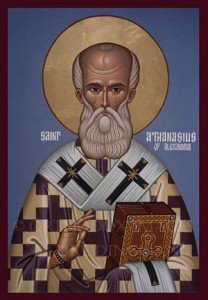In the last issue of the Bulletin, I began sharing should thoughts about one of the greatest Eastern Fathers of the Church, St. Athanasius. Outside the pages of the New Testament itself, Athanasius is probably the man to whom we chiefly owe the preservation of the Christian faith. He was born around AD 298, and lived in Alexandria, Egypt, the chief center of learning of the Roman Empire.
In 313 the Emperor Constantine issued the Edict of Milan, which changed Christianity from a persecuted to an officially favored religion. About six years later, a presbyter (elder, priest) Arius of Alexandria began to teach concerning the Word of God, Jesus, that God begot him, and before he was begotten, he did not exist. Athanasius was at that time a newly ordained deacon, secretary to Bishop Alexander of Alexandria, and a member of his household. His reply to Arius was that the begetting, or uttering, of the Word by the Father is an eternal relation between Them, and not a temporal event. Arius was condemned by the bishops of Egypt (with the exceptions of Secundus of Ptolemais and Theonas of Marmorica), and went to Nicomedia, from which he wrote letters to bishops throughout the world, stating his position.
The Emperor Constantine undertook to resolve the dispute by calling a council of bishops from all over the Christian world. This council met in Nicea, just across the straits from what is now Istanbul, in the year 325, and consisted of 317 bishops. Athanasius accompanied his bishop to the council, and became recognized as a chief spokesman for the view that the Son was fully God, co-equal and co-eternal with the Father.
The party of Athanasius was overwhelmingly in the majority. (The western, or Latin, half of the Empire was sparsely represented, but it was solidly Athanasian, so that if its bishops had attended in force, the vote would have been still more lopsided.) It remained to formulate a creedal statement to express the consensus. The initial effort was to find a formula from Holy Scripture that would express the full deity of the Son, equally with the Father. However, the Arians cheerfully agreed to all such formulations, having interpreted them already to fit their own views. Finally, the Greek word “homo-ousios” (meaning “of the same substance, or nature, or essence“) was introduced, chiefly because it was one word that could not be understood to mean what the Arians meant.

